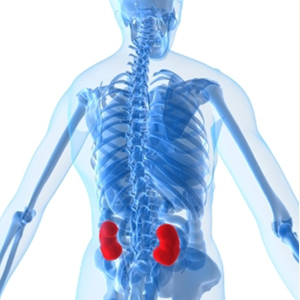
So-called "apple-shaped" people who carry more fat around their bellies than their hips may be at higher risk of kidney disease, a new study suggests.
The study measured blood flow through the kidneys of 315 men and women in the Netherlands. Those who had higher waist-to-hip ratios, meaning they tended to store more fat around their bellies compared to their thighs, also had higher blood pressure in their kidneys, even if they were not overweight.
Over time, elevated blood pressure damages the small vessels in the kidneys and can decrease their ability to siphon waste from the blood.
What the study found
The study found that each one-unit increase in waist-to-hip ratio was linked to a loss of blood flow through the kidney's tiniest filtres, the glomeruli, of about 4 millilitres per minute.
To put that number in context, glomerular filtration rate drops about 1 millilitre per minute every year of normal ageing, said Dr Deidra Crews, a nephrologist and assistant professor at the Johns Hopkins University School of Medicine, in Baltimore.
"That is clinically significant, and argues strongly for patients to achieve and maintain a normal waist-to-hip ratio in order to lower their chances of kidney disease," said Crews, who was not involved in the study.
The finding was particularly striking to the researchers because "we found that association in healthy subjects who didn't have high blood pressure or diabetes," said study co-author Arjan Kwakernaak, a doctoral student at the University of Groningen Medical Center.
Body weight didn't seem to alter the association, but the bigger a person was, the more their risk increased.
"If you have a higher waist-to-hip ratio and you are overweight, you have even a higher risk of having elevated kidney blood pressure," Kwakernaak said.
Be aware but no panic
Researchers aren't sure why belly fat might be bad for the kidneys, and the study doesn't show that abdominal fat is directly responsible for changes in the kidney.
But the findings fit nicely with previous studies that have shown that storing fat around the midsection, particularly around the liver, strongly increases the risk for heart disease and diabetes, both of which are linked to kidney disease.
Until more is known, Crews said patients should be aware of the link, but shouldn't panic over it.
The study wasn't able to show when a person's waist-to-hip ratio might put them in the danger zone.
The World Health Organization defines abdominal obesity as a waist-to-hip ratio over 0.85 for women and over 0.9 for men.
"Doctors should consider elevated waist-to-hip ratio as a risk factor for kidney disease, and consider screening their patients accordingly," she said.
More information
To find out more about obesity's effects on health, head to the US National Heart, Lung, and Blood Institute.
(Copyright © 2013 HealthDay. All rights reserved.)




 Publications
Publications
 Partners
Partners











